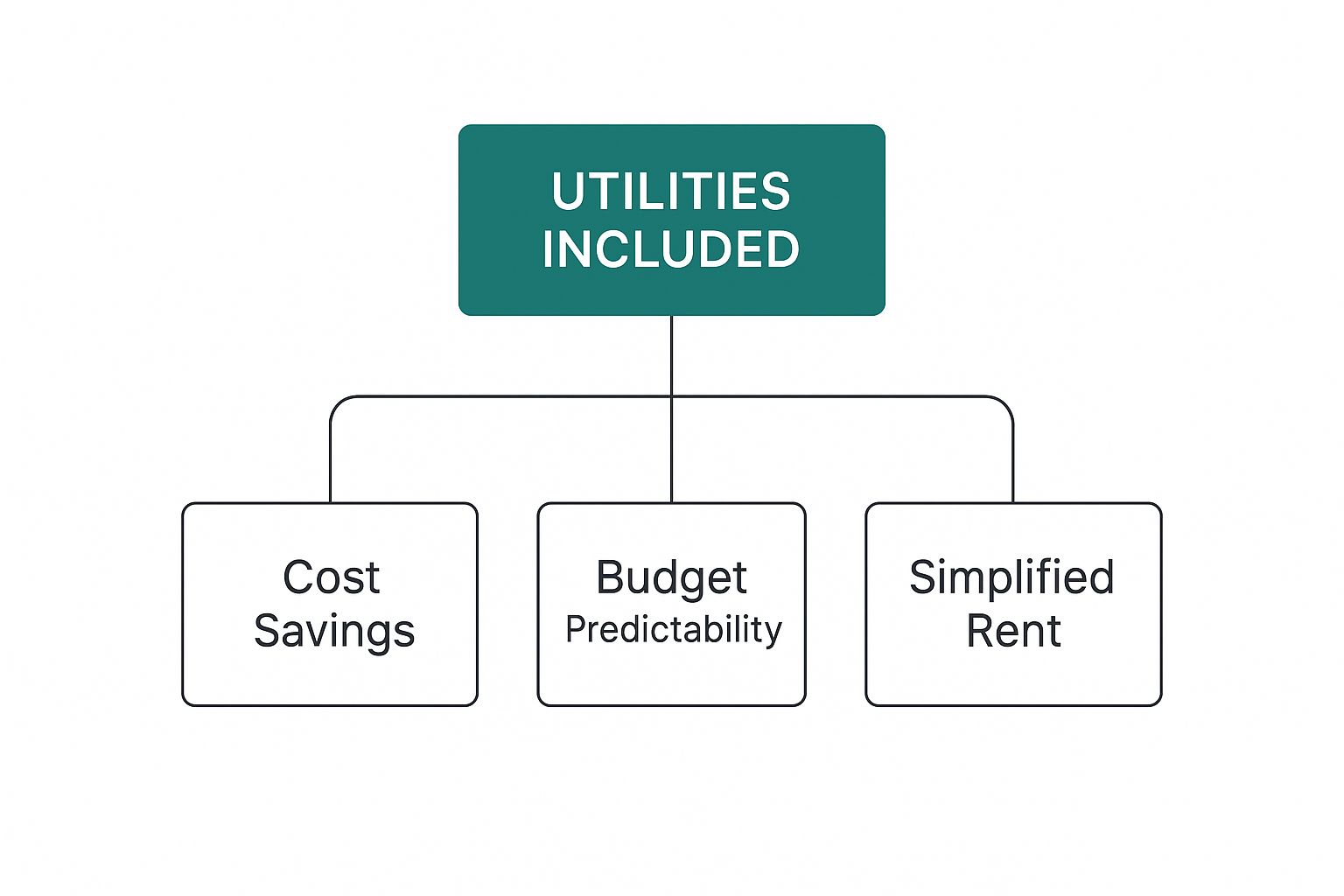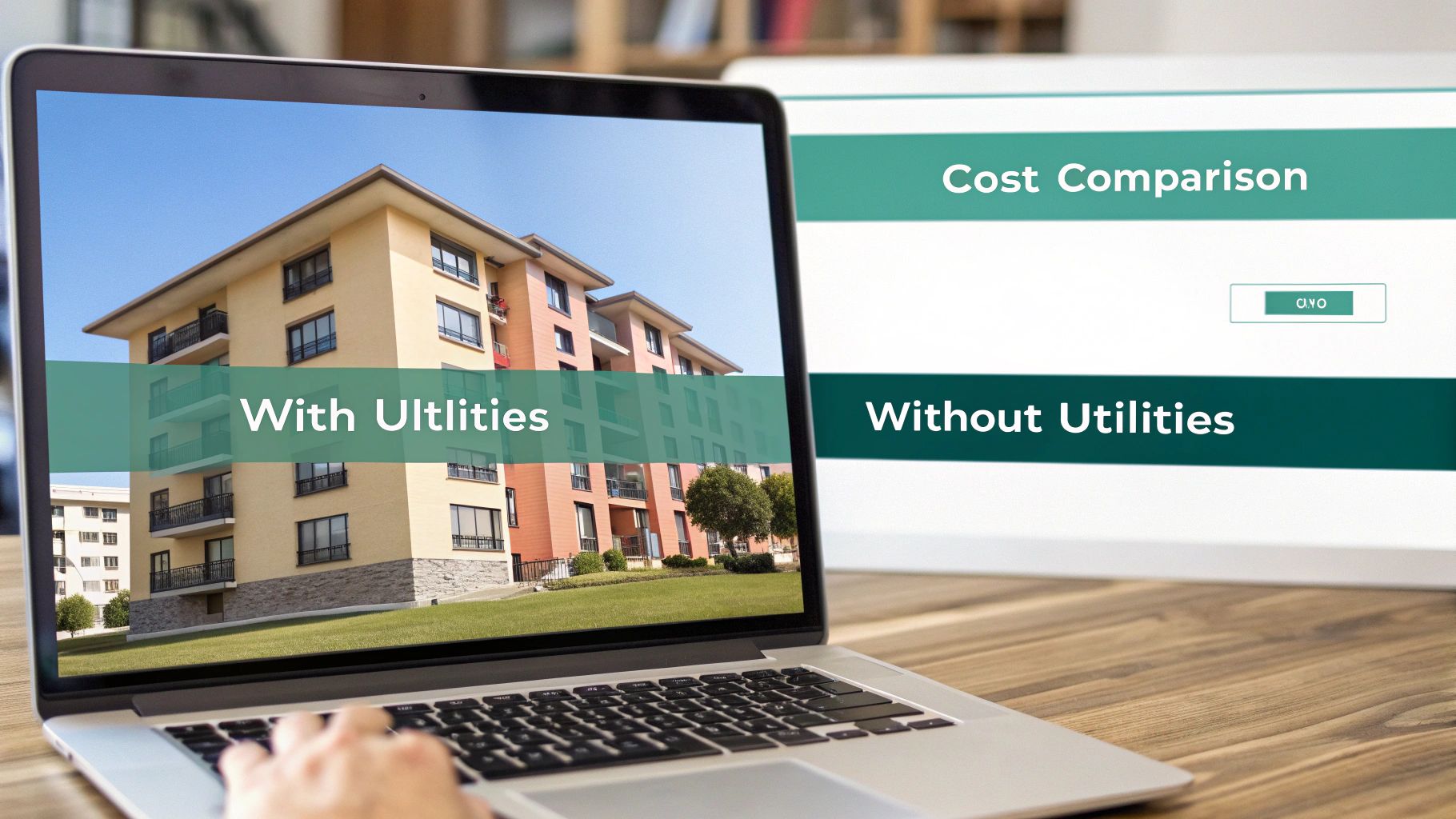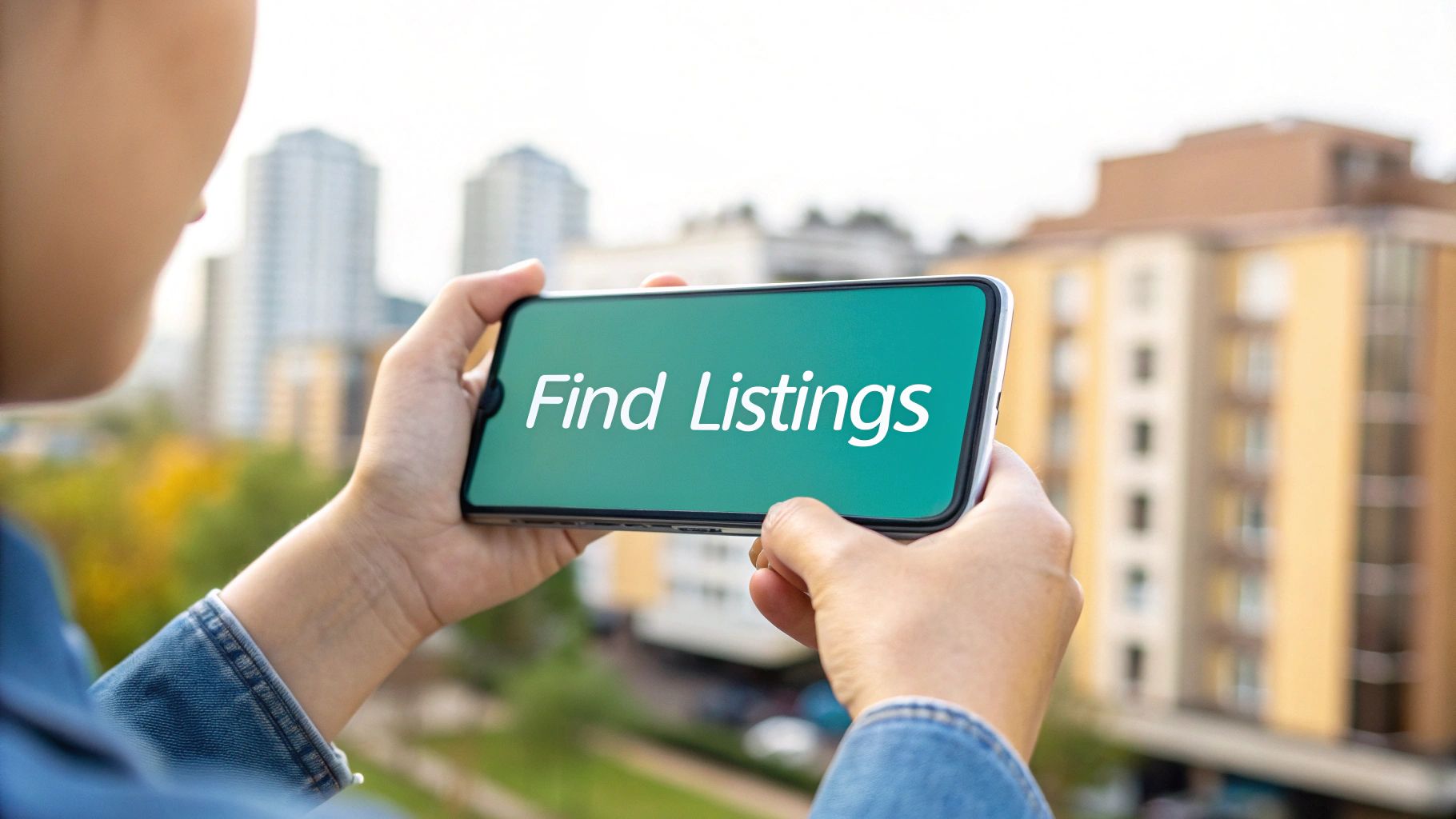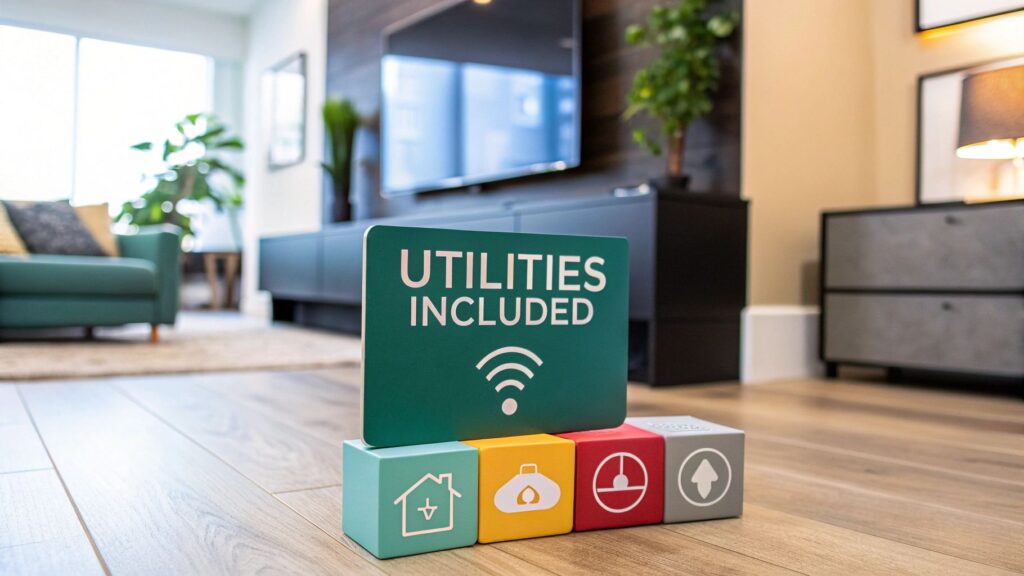When you see an apartment listed with "utilities included," it means your monthly rent covers more than just the space you live in. Think of it as an all-inclusive deal for your home; one single payment takes care of your rent and essential services like water, electricity, and trash removal.
This approach simplifies your monthly budget down to one predictable number. You won't have to juggle multiple due dates or worry about unexpected price spikes from the power company.
What "Utilities Included" Actually Means
For many people, especially first-time renters, finding an apartment with utilities included feels like hitting the jackpot. Instead of the usual hassle of setting up individual accounts for water, gas, and electricity, your landlord handles all of that. They bundle the estimated cost of these services right into your rent, which means you write one check and you're done.
But here’s a crucial detail: the phrase "utilities included" isn't a one-size-fits-all term. What's covered can change from one apartment complex to another, and even from one unit to the next.
Breaking Down the Bills
To get a clearer picture, let's look at how the responsibility for utilities usually shakes out in a typical rental agreement versus one where utilities are included.
Utilities Breakdown Standard vs Included Lease
| Utility Type | Standard Lease Who Pays | Included Lease Who Pays |
|---|---|---|
| Water & Sewer | Landlord | Landlord (via rent) |
| Trash Removal | Landlord | Landlord (via rent) |
| Gas | Tenant | Landlord (via rent) |
| Electricity | Tenant | Landlord (via rent) |
| Internet/Cable | Tenant | Tenant (usually) |
As you can see, in a standard lease, you're on the hook for your own consumption of things like gas and electricity. With an "all-inclusive" lease, the landlord takes care of it. However, it's rare for things like your internet or premium cable package to be included. You'll almost always need to set that up yourself.
For a deeper dive into these common arrangements, this guide on tenant and landlord utility responsibilities is a great resource.

The biggest draws are undeniably the convenience and predictability. You know exactly what your main housing expense will be every single month, which takes a lot of the guesswork—and stress—out of managing your finances.
Calculating the True Cost of Convenience

So, what’s the bottom line? Does a utilities-included apartment actually save you money? That's the million-dollar question for renters. While the one-and-done payment is a huge draw, it's crucial to remember those utilities aren't free—they’re just bundled into your rent.
Think of it this way: landlords look at the historical utility usage for a unit to figure out an average cost. They then roll that number into the base rent. But to play it safe and cover their bases against someone who blasts the AC all summer, they usually add a little extra padding. That "convenience fee" is built right into your monthly payment.
Running the Numbers: A Side-by-Side Look
The only real way to see if you're getting a good deal is to sit down and do the math. You’re essentially comparing a bundled price against an à la carte price. Let’s put it into perspective with a quick breakdown.
Here’s a simple comparison to see how the numbers can stack up.
Example Scenario: Cost Comparison
| Cost Component | Apartment A (Standard Lease) | Apartment B (Utilities Included) |
|---|---|---|
| Base Rent | $1,800 | $2,100 |
| Est. Electricity | $105 | Included |
| Est. Water/Sewer | $35 | Included |
| Est. Trash | $15 | Included |
| Total Monthly Cost | $1,955 | $2,100 |
In this case, the convenience of the all-inclusive apartment comes with a $145 monthly premium. Of course, your actual usage could be higher or lower than the estimates, but this illustrates how a seemingly simple package can sometimes hide a higher overall cost.
For a deeper dive, check out our comprehensive guide on budgeting for your Boca Raton apartment.
Weighing the Pros and Cons for Your Lifestyle
Deciding on an apartment with utilities included is a big move, and it really comes down to your lifestyle and what you're trying to achieve financially. It's not just about the bottom-line cost; it’s about what you value more—unbeatable convenience or complete control.
For a lot of folks, the biggest win is knowing exactly what their housing bill will be every single month. No more surprise spikes in your electricity bill during those scorching Florida summers. That kind of budget predictability is a huge relief.
But that convenience has its price. You could find yourself paying a bit extra for utilities you barely use. If you’re the type who is always mindful of the thermostat, you might indirectly be covering the costs for a neighbor who likes to keep their apartment like a walk-in freezer all year.
The Appeal of Simplicity
Let's be honest, one of the best things about an all-inclusive rental is how easy it makes everything. Just think about what you get to skip:
- Zero Setup Hassles: Forget spending hours on the phone with different utility companies, dealing with credit checks, and waiting around for activation appointments. You just show up, and everything is already on.
- Simplified Bill Management: Instead of juggling separate due dates for rent, power, water, and trash, you have one simple payment. That's it.
- Roommate Harmony: Splitting bills is a classic source of roommate drama. When utilities are rolled into the rent, you can avoid those awkward "who used more electricity" conversations entirely.
Potential Downsides to Consider
On the flip side, all that simplicity can mean giving up some control and maybe even paying a little more in the long run. Landlords often build a bit of a buffer into that bundled rate to protect themselves from high usage, which means you might be paying more than you would on your own.
With the national average rent hovering around $1,624 per month, rising utility costs are a real worry for renters. A utilities-included apartment can shield you from those unexpected price jumps, even if the base rent seems a little higher at first. You can discover more insights about 2025 rent statistics on Apartments.com.
A key thing to remember is the potential loss of autonomy. In some buildings, the landlord controls a central thermostat. That means you might have very little say over how warm or cool your own apartment is, which can be a deal-breaker if you're particular about your comfort.
Is a Utilities-Included Apartment Right for You?
So, how do you decide? It really helps to see the benefits and drawbacks laid out side-by-side. This table should help you figure out if an all-inclusive setup at Cynthia Gardens fits your needs.
| Key Advantages (Pros) | Key Disadvantages (Cons) |
|---|---|
| Predictable Monthly Budget: One fixed payment makes financial planning a breeze. | Potentially Higher Cost: You might pay more than your actual usage. |
| Move-In Ready: No need to set up accounts or pay activation fees. | Less Control: You may not be able to control your own thermostat settings. |
| Simplified Living: Fewer bills to track and pay each month. | Hidden Costs: The bundled rate might not cover everything (like internet). |
| Avoids Roommate Conflicts: No more arguments over splitting utility bills. | No Reward for Conservation: You won't save money by using less energy. |
Ultimately, the best choice depends on what you prioritize. If you value a simple, predictable monthly payment above all else, an all-inclusive apartment could be a perfect fit. But if you're a diligent saver who wants total control over your consumption and costs, you might be better off managing your own utilities.
Why Location and Climate Shape Your Rental Deal

You can't just assume an apartment with utilities included means the same thing everywhere. The reality is, what’s offered in your lease is heavily influenced by where you live. Local climate and regional energy costs are the two biggest factors that dictate what a landlord can realistically bundle into your rent.
Think about places with extreme weather—brutal winters in Minneapolis or scorching summers in Phoenix. In those cities, landlords are much warier of including electricity. The cost of blasting the heat or AC for months on end is a huge, unpredictable expense. If they do decide to roll it into the rent, you can bet that rent will be high enough to create a safety buffer for them.
On the other hand, in a city with a mild, temperate climate, the financial risk for the property owner is much, much lower. That's why you'll see all-inclusive deals far more often in those locations.
A Tale of Two Cities
Let's look at a real-world comparison to see how this plays out. Here in Boca Raton, Florida, air conditioning isn't a luxury; it's a necessity. That constant demand drives up electricity bills, making it a significant cost for anyone to absorb. Our guide on https://cynthiagardens.com/affordable-heating-and-air/ dives into how we manage these kinds of local climate challenges.
Now, let's jump across the pond to a city like Lisbon, Portugal. The climate there is incredibly moderate, so the need for constant heating or cooling just isn't there. Naturally, this has a direct impact on utility costs.
In Lisbon, the average monthly bill for basic utilities in an 85-square-meter apartment is about €115, with internet adding another €33. Because the mild weather keeps energy use low, it's simply more feasible for landlords there to offer all-inclusive packages without taking a huge financial risk.
Keeping these geographical differences in mind is key. It helps you understand why a great rental deal in one city might be completely unheard of in another, ultimately making you a much savvier apartment hunter.
Critical Questions to Ask Before You Sign Anything

Finding a great apartment with utilities included feels like hitting the jackpot. But before you celebrate, it's crucial to look past the attractive headline and get into the nitty-gritty of the lease agreement. The word "included" can mean different things to different landlords, and the details can make or break your budget and comfort.
Think of it this way: you wouldn't buy a "fully loaded" car without asking what features that actually includes. Is it just power windows, or does it have the premium sound system and heated seats? The same principle applies here. You need to ask the right questions to make sure you know exactly what you're getting.
Clarifying the Terms of Your Agreement
Before your pen ever touches that paper, get crystal clear on the rules. A simple misunderstanding now could lead to some serious financial or lifestyle headaches down the road. Here are the must-ask questions to get the full picture.
- Is there a utility usage cap? This is a big one. Some landlords cap the "included" amount for electricity or gas. If you go over that limit, you'll be on the hook for the difference.
- Who controls the thermostat? Don't overlook this. In some buildings, the heat and A/C are centrally controlled by the landlord, which means you have little say over the temperature in your own apartment.
- How are overage fees calculated and billed? If you do exceed a utility cap, you need to understand precisely how that overage is calculated and when you'll have to pay it. Is it added to next month's rent? Is it a separate bill?
- What is the included internet speed? If Wi-Fi is part of the deal, ask about the specific Mbps for downloads and uploads. What's considered "basic" might not be enough if you work from home or love to stream in 4K.
Make sure the answers to these questions are in writing, right there in the lease. A verbal promise is nice, but it won't hold up if there's a disagreement later. The lease is the only thing that counts.
Getting these details sorted is a vital step in the apartment-hunting process. For more help, check out these smart tips for navigating apartment lease agreements. By asking the right questions now, you can move into your new home with total confidence, knowing there won't be any unwelcome surprises.
Your Questions Answered
Stepping into the rental world, especially when looking at an apartment with utilities included, can stir up a lot of questions. Let's tackle some of the most common ones so you can move forward with confidence.
Are Utilities-Included Apartments Cheaper in the Long Run?
Honestly, not always. While the simplicity of a single bill is fantastic for budgeting, you could pay more over the course of a year than you would with separate bills. Think of it this way: landlords often build a "buffer" into the rent to cover their bases in case some residents use a lot of energy.
The only way to know for sure is to do a little homework. Look up the average local utility costs for a similar-sized apartment, tack that onto the rent of a standard unit, and then compare that total to the all-inclusive price. The all-inclusive deal is only truly cheaper if your personal usage is consistently higher than what the landlord has estimated.
What Happens If I Use Too Much Electricity or Water?
This is a big one, and the answer lives entirely in your lease agreement. It's probably one of the most critical questions to ask before you even think about signing. Many leases for an apartment with utilities included will have a "utility cap."
This means if your usage blows past a certain limit—say, a $100 cap for electricity—you'll get a bill for the overage. In other places, the landlord might eat the extra cost initially but then raise everyone's rent at renewal time to compensate for high building-wide usage. Always, always get this policy in writing.
The lease is your ultimate source of truth. A verbal confirmation is helpful, but what’s written in the signed agreement is what legally matters. Make sure any promises about utility caps or overages are clearly stated.
Can I Control My Own Thermostat in an All-Inclusive Apartment?
This really comes down to the building's age and setup. In older buildings with one central system, the landlord often controls the temperature for everyone. This can be a huge point of frustration if you run hotter or colder than your neighbors.
However, in most modern units with individual HVAC systems, you'll have your own thermostat. Don't leave it to chance. To avoid any chilly or sweltering surprises, ask the leasing agent a very specific question: "Do I have individual control over the heat and air conditioning in my specific unit?"
Is Internet and Cable Usually Part of the Deal?
It's much less common for these to be included compared to essentials like water, sewer, and trash. When they are thrown in, it's often a basic, slower plan that might not cut it for everyone.
You'll want to ask about the specific internet speed (in Mbps) and what the channel lineup looks like. If you work from home, are a serious gamer, or love to stream in 4K, the included package might not be powerful enough. You could end up paying for a separate, faster plan on top of your rent, which defeats some of the convenience.
Ready to find a straightforward, comfortable living experience in Boca Raton? Cynthia Gardens offers serene, spacious apartments with clear lease terms and responsive management. Discover your new home today!
